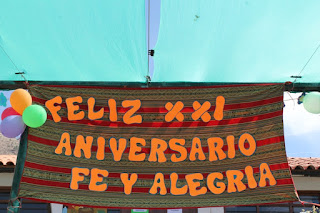The Festival of
Folkloric Dances is the highlight of FyA 44's anniversary
celebrations. Every afternoon for the two weeks before the festival
the school is open late as teachers and students spend hours
practicing. The festival itself, as you may remember, lasts for
hours. It's scheduled to start at two o'clock, and opens by 3. Then
it lasts for at least 4 hours of dance after dance after dance.
Parents, students, and staff all participate.
 |
| 10th graders present Salla - one of the most popular dances. |
I
danced with the administration (because these days more of my time is
spent on Pastoral work than in a classroom). The costume for our
dance included ojotas
– sandals made out of black rubber that most people in the Andes
wear every day. I'm not most people in the Andes; I don't have
ojotas. The need for
ojotas wasn't
clarified until the night before the dances. So on Thursday, after
lunch at the school, I hurried to Urcos to buy sandals. I got there
just as the woman was packing things up. “Mamay espere,
wait!” I called. She pulled
out a stool and asked my foot size. I told her my American size, and
to my amazement, she knew the conversion. She pulled out a pair that
fit the soles of my feet perfectly, but were slightly loose around
the straps – apparently I have thin feet compared to the people I
live around. I handed over S/. 10 for the ojotas
and got back in a car to return to Andahuaylillas. I made it to the
school just in time to watch the 4 year olds open the festival with a
dance that recreated the pilgrimage to the Virgen del
Carmen de Paucartambo.*
 |
| Preschoolers reenact the dances from Paucartambo |
 |
| A girl ready for her dance watches her younger classmates. |
 |
| In this dance, the people fight off a saqra (demon) that's been plaguing their town. |
 |
| This dance is about taking in the harvest. |
It
was dark by the time I danced. Our dance, called “Carnaval
de Tullusmayo,” involved lots
of small jumps. To my surprise, the ojotas
actually made that easier, not what you'd expect from something that
looks like it was stapled together out of leftover tire material.
Dancing is always a lot of fun. Near the end of our performance I
caught Hermana Vilma's eye across the crowd and she gave me a big
thumbs up.
 |
| That's me dancing! |
 |
| Preschool teachers present their dance. |
The day after the dances, I was complemented many times on my
dancing. A man who I recognized from translating with the doctors
LINK stopped me in the street. “It's so nice to see someone from
far away dancing the steps of our traditional culture,” he told me,
“especially because your people usually don't have rhythm.” He
pantomimed someone dancing badly. Karla, one of the student teachers,
also caught me the next day when I walked into the office in the
morning: “Benjamín, you danced so well yesterday. You, doing all
those steps like a Peruvian, who would have believed you could do
it?”
“I did,” I told her. I knew I could do it, because I've been
proving for quite some time that this white boy does have rhythm and
knows how to get down.
 |
| Mountain House - presente! |
*Paucartambo
is a place that, much like Qoylurritti, hosts thousands of pilgrims
every year who go to dance for and pray to the Virgen del
Carmen. WHICH VIRGEN IS SHE.
Having never been, I can't tell you much more than that.









No hay comentarios.:
Publicar un comentario